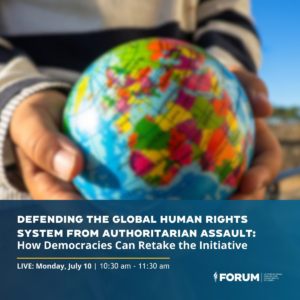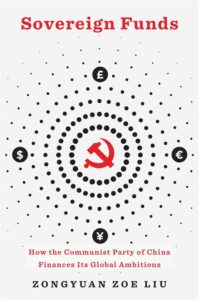 Chinese President Xi Jinping has promulgated a new law on foreign affairs to legitimize tough measures that Beijing is taking against the “bullying” of the “hegemonic West,” notes Dr. Willy Wo-Lap Lam. The statute, “The Law on Foreign Relations of the People’s Republic of China (PRC),” which takes effect on July 1, will also anchor the supreme leader’s long-standing aspiration to build a China-centric global order that will challenge the framework established by the US-led Western Alliance since the end of World War II, he writes for The Jamestown Foundation.
Chinese President Xi Jinping has promulgated a new law on foreign affairs to legitimize tough measures that Beijing is taking against the “bullying” of the “hegemonic West,” notes Dr. Willy Wo-Lap Lam. The statute, “The Law on Foreign Relations of the People’s Republic of China (PRC),” which takes effect on July 1, will also anchor the supreme leader’s long-standing aspiration to build a China-centric global order that will challenge the framework established by the US-led Western Alliance since the end of World War II, he writes for The Jamestown Foundation.
International observers have raised the question of whether the Foreign Relations Law is mainly geared toward consolidating Xi’s Mao-like status as “core of the party for life,” Lam adds. According to Sinologist [and National Endowment for Democracy (NED) board member] Minxin Pei, while the statute “provides Beijing a legal instrument to impose sanctions on its adversaries in the future… Beijing does not need this legal instrument to punish its adversaries.”
Xi Jinping May Be Souring on His ‘Best, Most Intimate Friend’, says an adviser to President Barack Obama on China policy. Russia remains the only other country in the world with the means and motivation to partner with China in diluting the role of human rights and democratic governance in the international system, he writes for The Times:
Steady relations also ensure stability along their long land border and keep China supplied with discounted Russian energy, as well as imports of food and military equipment. Both sides can be expected to maintain the appearance of business as usual. But Mr. Xi has little to gain from doubling down on Mr. Putin, whose troubles are not helpful for China’s grand plans.

How the CCP Finances its Global Ambitions
In the latest episode of Pekingology, CSIS Freeman Chair Jude Blanchette is joined by Zongyuan Zoe Liu, a fellow for international political economy at the Council on Foreign Relations and author of the new book Sovereign Funds: How the Communist Party of China Finances Its Global Ambitions.
The U.K.-based exiled Hong Kong trade unionist Mung Siu-tat was one of eight prominent pro-democracy figures named on Monday as wanted by the Hong Kong national security police, who offered a HK$1 million bounty for information leading to the arrest and prosecution of each person, RFA reports:
Mung, who once led the now-disbanded pro-democracy Hong Kong Confederation of Trade Unions, stands accused under the law of “smearing” the Chinese and Hong Kong governments during an overseas conference last June, and of advocating Hong Kong independence, defined as “secession” under the law. He said the Hong Kong government has repeatedly used “national security” as a pretext to curtail fundamental freedoms and human rights, with arbitrary arrests of dissidents now the norm rather than the exception.
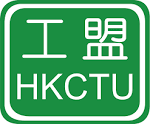
Despite having a bounty on his head, Mung has vowed to keep fighting against the Chinese Communist Party’s authoritarian rule from overseas, RFA adds.
It’s performative “moustache twirling”, Alvin Cheung of Queen’s University Faculty of Law in Canada, tells The Economist:
Hong Kong’s government is exasperated with Western criticism of the security law, under which more than 260 people have been arrested, including four on July 5th for allegedly supporting people overseas who “endanger national security”. Last month members of the European Parliament called for sanctions on Hong Kong officials over the “deterioration of fundamental freedoms” in the city. Britain has accepted nearly 150,000 visa applications from Hong Kongers under a special scheme since the security law was introduced.
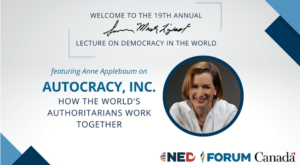
Autocrats are proving more resilient these days, The WSJ’s David Luhnow and Juan Forero observe:
A regime survival playbook of sorts has emerged, with states combining lethal force and widespread arrests to halt protests, targeting opposition leaders with selective killing, jailing and exile, and allowing disaffected populations to leave. Regimes from Belarus to China to Venezuela have also been cooperating more closely to withstand diplomatic pressure from the West, get around economic sanctions and employ increasingly sophisticated surveillance technologies to keep track of dissidents.
Personalized autocracies are harder to root out because the entire system is built around one person, they add. They are also less likely to give way to a negotiated transition or democracy as a result, political scientists say. It is worth noting that China has transitioned recently from an institutional autocracy to a more personalized one under Xi.
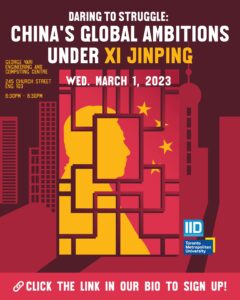
“We never knew that the rest of the world would be so indifferent to this war in Ukraine,” says a scholar from China’s national-security establishment, predicting that the conflict will accelerate the coming of an Asian century. “This is a blow to Western centrality to the world order.”
Rich-world democracies should not underestimate the appeal of China’s arguments, especially in the Global South, The Economist adds:
In part, the West is paying the price for ignoring international rules when it suited, during decades of dominance. As in 1945, universal values need defending from first principles. Transparent rule, free speech and independent courts are not, in truth, tenets of some alien, Western religion. Accountable governance is like clean water: a public good that all deserve to enjoy. Liberal democracies are entitled to notice China leading the fight against such rights. Even as it denounces the West for dividing the world into blocs, China is making that very move.
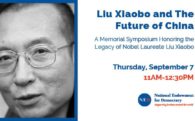
For China’s poorer neighbours, investments in infrastructure help compensate for its domineering ways. …Yet such initiatives are often undermined by a tendency to over-promise and to ignore local sentiment, The Economist reports:
A recent survey by Singapore’s ISEAS-Yusof Ishak Institute found little faith in China among its South-East Asian neighbours. More people expressed distrust than trust of it in Malaysia, Myanmar, Vietnam and the Philippines. Japan was more trusted in all six of China’s neighbours in the region and America more so in five. China also ranked below America, Australia and the EU as a place to visit or study.
So much for Beijing’s vaunted “sharp power.”
Please join PEN America and ChinaFile for a discussion with internationally acclaimed Chinese author Liao Yiwu. A reporter, novelist, poet, and musician, Liao is best known for The Corpse Walker, his 2008 collection of interviews with laborers, migrants, and other people living at the margins of China’s economic boom, and for For a Song and a Hundred Songs, a memoir of the prison term he served for his writings about the Tiananmen protests. Since 2011, he has lived in exile in Berlin.
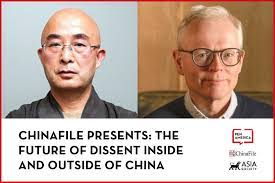 In conversation with the Council on Foreign Relations’ Ian Johnson, Liao will discuss the role of political dissent in exile, the use of fiction as a means for grappling with history, as well as his recent novels Wuhan, about the outbreak of COVID-19, and Love in the Times of Mao Zedong, set during the Cultural Revolution, and his documentary film on the construction of a Taiwanese memorial to Nobel Peace Prize-winning dissident Liu Xiaobo.
In conversation with the Council on Foreign Relations’ Ian Johnson, Liao will discuss the role of political dissent in exile, the use of fiction as a means for grappling with history, as well as his recent novels Wuhan, about the outbreak of COVID-19, and Love in the Times of Mao Zedong, set during the Cultural Revolution, and his documentary film on the construction of a Taiwanese memorial to Nobel Peace Prize-winning dissident Liu Xiaobo.
Asia Society, 725 Park Avenue, New York, NY 10021212-288-6400.
Wednesday, July 12, 2023 | 6:30 pm – 8:00 pm ET. RSVP
Sinologist & @NEDemocracy board member @MPEI2014 says while a new statute gives the #CCP “a legal instrument to impose sanctions … Beijing does not need this legal instrument to punish its adversaries,” @JamestownTweets‘s #WillyLam writes. https://t.co/dSSyEgBaMD
— Democracy Digest (@demdigest) July 6, 2023
The UN human rights system is under threat from a coalition of authoritarian powers. How can democracies work together to uphold the system and hold abusers accountable?
Register for a virtual event launching the International Forum’s new report, “Defending the Global Human Rights System from Authoritarian Assault: How Democracies Can Retake the Initiative.”
Featuring remarks from report author Dr. Rana Siu Inboden and Dr. Sophie Richardson, the conversation will center on this crucial challenge to global democratic integrity. The event will take place on July 10 at 10:30 am EDT on the National Endowment for Democracy’s YouTube channel. RSVP.
